WebAssembly
Safe binary format with Web in mind
What is it?
Efficient and portable bytecode
Possible compilation target
Stack machine language
Why?
- Almost native performance
- Secure execution model
- More languages!
How does it look like? v1
00 61 73 6d 01 00 00 00 01 00 01 60 01 7c 01 7c 06 03 00 01 00 02 07 00 01 03 66 61 63 00 00 07 0a 00 01 00 00 20 00 44 00 00 00 00 00 00 f0 3f 63 04 7c 44 00 00 00 00 00 00 f0 3f 05 20 00 20 00 44 00 00 00 00 00 00 f0 3f a1 10 00 a2 0b 0b 2c 2e 00 00 04 6e 61 6d 65 01 00 01 00 03 66 61 63 06 02 00 01 00 01 00 00 05 14
How does it look like? v1
(module
(func $fac (param f64) (result f64)
get_local 0
f64.const 1
f64.lt
if (result f64)
f64.const 1
else
get_local 0
get_local 0
f64.const 1
f64.sub
call $fac
f64.mul
end)
(export "fac" (func $fac)))How does it look like? v1
const instance = new WebAssembly.Instance(wasm, {});
for (let i = 1; i <= 15; i++) {
console.log(instance.exports.fac(i));
}
How does it look like? v2
#![feature(proc_macro, wasm_custom_section, wasm_import_module)]
extern crate wasm_bindgen;
use wasm_bindgen::prelude::*;
#[wasm_bindgen]
extern {
fn alert(s: &str);
}
#[wasm_bindgen]
pub fn greet(name: &str) {
alert(&format!("Hello, {}!", name));
}
How does it look like? v2
import {greet} from './greet.rs';
greet('World');How does it look like? v3
Give me numbers!



7 full integrations
15 almost there
11 started
Cool websites
Clearly defined standards
Future!
